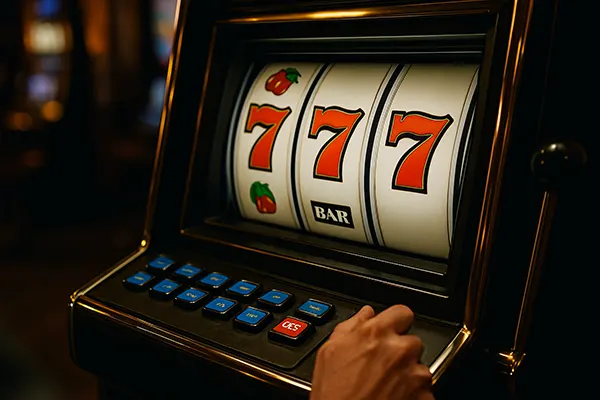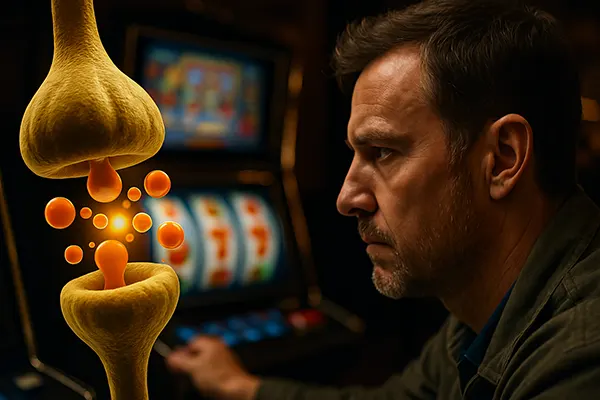
Azard and the Brain: How Slot Machines Manipulate Our Dopamine System
Slot machines are designed not just to entertain but to tap into the human brain’s reward system. Through clever psychological tricks and neuroscience-informed mechanics, these games activate dopamine release, making players return repeatedly. This article explores how slot machines manipulate brain chemistry to drive behaviour, presenting facts relevant to active and potential casino players as of February 2025.
The Role of Dopamine in Gambling Behaviour
Dopamine is a neurotransmitter associated with pleasure, reward, and motivation. When we engage in pleasurable activities—such as eating, socialising, or winning a small prize—our brains release dopamine, reinforcing the action. Slot machines are engineered to exploit this mechanism by delivering unpredictable rewards that keep the brain craving more.
Unlike predictable rewards, variable ones—as used in slot machines—release more dopamine. This unpredictability mimics natural reward cycles, creating a loop where players chase the next win, even if it’s small. It’s not the size of the reward but its unexpected nature that keeps the dopamine flowing and engagement high.
Neurological research conducted at institutions like the University of Cambridge and Stanford confirms that even near-misses in slot games stimulate dopamine activity. This reinforces the illusion of control and encourages continued play, despite actual odds remaining unchanged. These tricks create a potent psychological cycle that can lead to compulsive gambling.
Slot Design and Psychological Conditioning
Slot machines employ a technique known as “classical conditioning.” Sounds, flashing lights, and celebratory animations—even during losses—mimic the environment of a win, training the brain to associate play with pleasure. Over time, this causes players to enjoy the experience regardless of outcomes.
Many slots also implement “losses disguised as wins” (LDWs), where the machine celebrates despite a net loss. For example, betting €1 and winning €0.40 will still trigger bright visuals and cheerful sounds. This creates the illusion of success, reinforcing behaviour through sensory reward rather than actual financial gain.
These mechanisms can be particularly influential on vulnerable individuals or those predisposed to risk-taking. Research from the UK Gambling Commission shows that certain slot games can trigger rapid repeat play patterns, increasing the risk of problem gambling. The design intentionally feeds into the dopamine cycle, creating a loop that’s hard to break.
Neurological Impact of Repeated Slot Machine Use
Long-term engagement with slot machines can lead to significant changes in brain function, particularly in areas related to impulse control, decision-making, and reward anticipation. These adaptations mirror those observed in substance addiction, indicating the serious neurobiological risks involved.
Over time, players may experience a condition called “dopamine downregulation,” where the brain reduces its response to rewards due to overstimulation. As a result, gamblers require longer or more intense sessions to feel the same pleasure they once experienced. This condition significantly increases the potential for addiction.
Brain imaging studies conducted in Germany and the Netherlands have revealed reduced grey matter in the prefrontal cortex of individuals with gambling disorders. This part of the brain is responsible for rational thought and impulse control. When its function deteriorates, players become more susceptible to impulsive and risky decisions, such as continuing to gamble after significant losses.
The Reinforcement Loop and Time-on-Device Strategy
Casino operators benefit from what’s called “time-on-device,” meaning the longer a player engages with a game, the higher the revenue. To maximise this, slot machines are fine-tuned to prolong play by offering frequent small wins and triggering dopamine spikes. This constant engagement maintains the reinforcement loop, making players less likely to step away.
Autoplay features, fast spin options, and minimal downtime between rounds further facilitate continuous play. These functions reduce cognitive reflection time, nudging users into a near-hypnotic state. For many, playing slots becomes a ritualistic behaviour rather than a conscious choice.
Because dopamine isn’t just linked to pleasure but also to anticipation, slot machines maintain engagement even in loss-heavy sessions. The player’s brain becomes hooked on the *possibility* of a win, not the win itself, reinforcing repetitive behaviour without any need for consistent reward.

Prevention and Responsible Gambling Solutions
Understanding the neurological impact of slot machines is essential in building effective responsible gambling strategies. Governments and operators in the UK and EU have taken active steps to introduce mandatory time-outs, spin delays, and deposit limits to break the dopamine-driven engagement cycle.
Technological interventions are now integrated into many platforms. For instance, algorithms can detect signs of problem gambling—such as increased frequency of play or rapid deposit patterns—and issue warnings or restrict accounts. Some platforms even offer players dopamine-neutral versions of slots, where animations and sounds are toned down to prevent over-stimulation.
However, responsibility doesn’t rest solely on external systems. Educating players about the dopamine mechanisms involved in gambling is crucial. Awareness empowers individuals to recognise when engagement becomes compulsive and seek help before reaching critical thresholds. National hotlines and third-party services like GamCare and BetBlocker remain vital tools in this process.
The Future of Ethical Slot Machine Design
Recent innovations in game design suggest a shift toward ethical development. Some providers are exploring “behaviour-sensitive” slots that adapt gameplay if a player demonstrates signs of unhealthy engagement. These slots may reduce sensory triggers or initiate cooling-off periods autonomously.
Furthermore, regulators are increasingly enforcing transparency in slot RTP (return-to-player) rates and volatility indicators, enabling users to make more informed choices. Enhanced player dashboards showing total time spent and net outcomes are also becoming industry standards in 2025.
Ultimately, aligning commercial success with public health interests is both necessary and achievable. Ethical game design, transparent data, and neuroscience-based education could pave the way for a more balanced gambling experience that respects the player’s autonomy while mitigating harm.
Lignende artikler
-
 How to Choose the Best Online Casino for a Long-Term Gaming Experience
How to Choose the Best Online Casino for a Long-Term Gaming ExperienceChoosing the right online casino for a long-term gaming experience …
-
 Review of the Red Hot Fruits Slot from Spinomenal
Review of the Red Hot Fruits Slot from SpinomenalSpinomenal heats up the online slot scene with its fiery …
